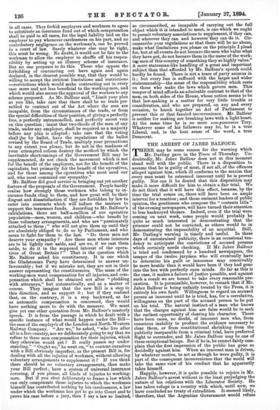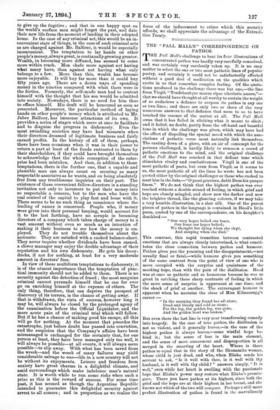THE ARREST OF JABEZ BALFOUR. T HERE may be some reason
for the warning which Mr. Darling gave in the Times of Thursday. Un- doubtedly, Mr. Jabez Balfour does not at this moment stand well with the public. There is a disposition to assume that he is guilty of most, if not all, of the offences alleged against him, which ill conforms to the maxim that every man must be esteemed innocent until he is proved guilty. Nor can it be denied that this disposition may make it more difficult for him to obtain a fair trial. We do not think that it will have this effect, because, by the time the trial comes on, there will have been an ample interval for a reaction ; and those eminent leaders of public opinion, the gentlemen who compose the " contents bills " of the evening newspapers, will have turned their attention to less hackneyed themes. Indeed, even if the trial were coming on next week, some people would probably be quite as much interested in demonstrating that the prisoner could not be convicted, as others would be in demonstrating the impossibility of an acquittal. Still, Mr. Darling's warning is timely and useful. In these days of unrestrained publicity, there is an occasional ten- dency to anticipate the convictions of accused persons which certainly needs checking. If Mr. Jabez Balfour is tried and condemned by a hundred newspapers, the temper of the twelve jurymen who will eventually have to determine his guilt or innocence may conceivably be more hostile than it would have been if they had gone into the box with perfectly open minds. So far as this is the case, it makes a failure of justice possible, and against such a result we are bound to take every reasonable pre- caution. It is permissible, however, to remark that if Mr. Jabez Balfour is being unfairly treated by the Press, it is entirely his own fault. Willingness to regard an accused person as innocent until he is tried, has, for a correlative, willingness on the part of the accused person to be put on his trial. The natural instinct of a man who knows that the charges against him are false would be to seek the earliest opportunity of clearing his character. There have been cases, no doubt, of innocent men who, from conscious inability to produce the evidence necessary to clear them, or from constitutional shrinking from the publicity inseparable from a criminal trial, have preferred flight to surrender, and Mr. Jabez Balfour may be one of these exceptional beings. But if he is, he cannot fairly com- plain that the first impression of the public has gone so decidedly against him. When an innocent man is driven, by whatever motive, to act as though he were guilty, it is part of the consequent inconvenience that the world will take the same view of his conduct that he apparently takes himself.
Happily, however, it is quite possible to rejoice in Mr. Jabez Balfour's arrest without in the least prejudging the nature of his relations with the Liberator Society. He has taken refuge in a country with which, until now, we have concluded no treaty of extradition. It seemed likely, therefore, that the Argentine Government would refuse to give up the fugitive ; and that in one happy spot on the world's surface men might forget the past, and date their new life from the moment of landing in their adopted home. In the case of any criminal act, this would be an in- convenient state of things, in the case of such criminal acts as are charged against Mr. Balfour, it would be especially inconvenient. The temptation to lay hands on other people's money, always great, is continually growing greater. Wealth, in becoming more diffused, has seemed to come more within reach. Men chafe more against not having what many have, than against not having what only belongs to a few. More than this, wealth has become more enjoyable. It will buy far more than it could. buy fifty years ago. There are a dozen ways of spending money in the nineties compared with what there were in the forties. Formerly, the self-made man had to content himself with the thought that his son would be admitted into society. Nowadays, there is no need for him thus to efface himself. His draft will be honoured as soon as presented. Moreover, the particular method of laying hands on other people's money which is attributed to Mr. Jabez Balfour, has immense attractions of its own. It provides a series of stages which serve at once to facilitate and to disguise the progress in dishonesty. Even the most swindling societies may have had moments when their directors dreamed of legitimate business and fairly earned profits. In the history of all of them, perhaps, there have been occasions when it was in their power to return a part at least of the funds entrusted to them by their shareholders, if they could have brought themselves to acknowledge that the whole conception of the enter- prise had been mistaken. And then, in addition to these temptations, there is the further one, that a capable and plausible man can always count on securing as many respectable associates as he wants, and on being absolutely free from any troublesome inquiries on their part. The existence of them convenient fellow-directors is a standing invitation not only to investors to put their money into so respectable a concern, but to the men who have the real control of the capital to play fast and loose with it. There seems to be no such thing as conscience where the lending of names is concerned. People who, if money were given into their personal keening, would account for it to the last farthing, have no scruple in becoming directors of a company which takes charge of money to a vast amount without even so much as an intention of making it their business to see how the money is em- ployed. They do not trouble themselves about the accounts: They are satisfied with a cooked balance-sheet. They never inquire whether dividends have been earned. a clever manager may enjoy the double advantage of their reputation and his own dishonesty. He gets his decoy- ducks, if not for nothing, at least for a very moderate amount in directors' fees.
In view of these multiform temptations to dishonesty, it is of the utmost importance that the temptation of prac- tical immunity should not be added to them. There is no security against the detection of fraud ; the most sanguine criminal cannot persuade himself that he can for ever go on enriching himself at the expense of others. The only thing, therefore, that can deprive the prospect of discovery of its terrors, is the chance of getting away. If that is withdrawn, the vista of success, however long it may be, will always be closed by the prolonged agony of the examination before the Official Liquidator, and the more acute pain of the criminal trial which will follow. But if he has a chance of making good his escape, all this will go for nothing. At the moment that precedes the catastrophe, just before doubt has passed into conviction, and the suspicion that the Company's affairs have been mismanaged is exchanged for the certainty that, for one person at least, they have been managed only too well, it will always be possible—at all events, it will always seem possible—to slip away. With what has been saved from the wreck—and the wreck of many failures may yield considerable salvage to one—life in a new country will not be without its enjoyments. Leisure and freedom from anxiety have great charms in a delightful climate, and amid surroundings which make indolence man's natural state. It is worth while to run some risks when such a prize as this is the reward of success. For some time past, it has seemed as though the Argentine Republic intended to guarantee this delightful security against arrest to all comers ; and in proportion as we realise the force of the inducement to crime which this security affords, we shall appreciate the advantage of the Extradi- tion Treaty.



















































 Previous page
Previous page